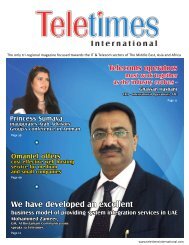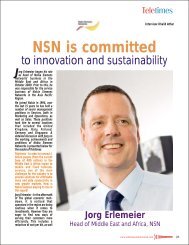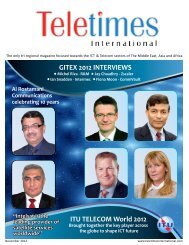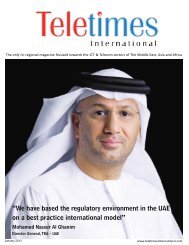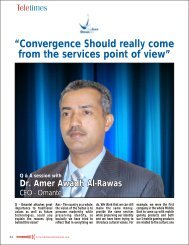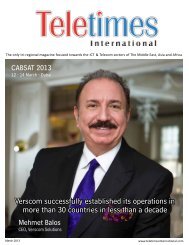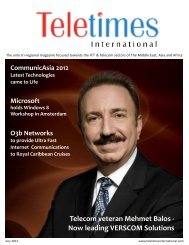Oct to Nov 2010 - Teletimes
Oct to Nov 2010 - Teletimes
Oct to Nov 2010 - Teletimes
You also want an ePaper? Increase the reach of your titles
YUMPU automatically turns print PDFs into web optimized ePapers that Google loves.
Tony Saghbini<br />
Lebanese bloggers:<br />
pioneers in the Arab world<br />
A<br />
recent survey of readers<br />
of the more than 400<br />
blogs in Lebanon shows that<br />
their numbers are close <strong>to</strong> the<br />
online readership of the most<br />
well-known Lebanese newspapers:<br />
both averaging 14,000<br />
visi<strong>to</strong>rs daily. This is a clear<br />
indication that blogs have become<br />
one of the main media<br />
sources for Lebanese youth <strong>to</strong><br />
access diverse information and<br />
various opinions.<br />
But do their high readership<br />
rates mean that blogs can be a<br />
<strong>to</strong>ol for real social and political<br />
change<br />
It is difficult <strong>to</strong> answer this<br />
question in a country in which<br />
the future of blogging is closely<br />
connected <strong>to</strong> conditions that<br />
frequently change, such as internet<br />
connectivity, internet<br />
publication laws and censorship.<br />
The blogosphere in Lebanon<br />
has recently witnessed several<br />
changes: the migration of<br />
some bloggers <strong>to</strong> newspapers,<br />
the publication of books containing<br />
material collected from<br />
electronic media, the launch<br />
of blogs by radio stations, and<br />
the birth of civil movements<br />
and new organizations that<br />
show the impact of blogs on<br />
the ground.<br />
In this way, the Lebanese<br />
blogosphere is breaking down<br />
the barriers that separate traditional<br />
media from electronic<br />
media. It has become an alternative<br />
media source on many<br />
issues, particularly the environment<br />
which isn’t routinely<br />
covered by traditional media.<br />
One example is coverage in the<br />
blogosphere of a young Lebanese<br />
man, Rami Eid, who spent<br />
three days and nights in a glass<br />
cube in the Ain el Mreisseh<br />
neighborhood in Beirut last<br />
<strong>Oct</strong>ober, representing the last<br />
man on earth in a hopeless future<br />
as a result of humankind’s<br />
failure <strong>to</strong> act against climate<br />
change. His stunt alerted the<br />
public about the need <strong>to</strong> face<br />
these changes.<br />
The media campaign for this<br />
experiment focused on electronic<br />
media, beginning with<br />
Eid’s personal blog which was<br />
read by thousands in just the<br />
first few days of the campaign.<br />
In addition, Twitter and Facebook<br />
sites reported on developments<br />
in real time. This<br />
coverage succeeded in galvanizing<br />
public opinion, the media<br />
and various environmental<br />
research centers, which culminated<br />
in the Lebanese government<br />
deciding <strong>to</strong> participate<br />
in international negotiations<br />
on combating climate change<br />
in Copenhagen in December<br />
2009.<br />
Lebanese blogs have also<br />
served as key political mobilization<br />
and organization <strong>to</strong>ols<br />
on many occasions, especially<br />
in preparing for the March<br />
for Secularism in April of this<br />
year. The march started with<br />
a Facebook invitation, as well<br />
as a few blog posts. It eventually<br />
developed in<strong>to</strong> a march<br />
in which thousands of people<br />
participated, without the need<br />
for a central organizing committee.<br />
And during the last municipal<br />
elections in Lebanon, in May<br />
<strong>2010</strong>, bloggers turned in<strong>to</strong> a<br />
makeshift independent elections<br />
moni<strong>to</strong>ring agency. Some<br />
of these bloggers – in partnership<br />
with a Beirut-based organization<br />
specializing in new<br />
media training called Social<br />
Media Exchange – were given<br />
a license by the Ministry of<br />
Interior <strong>to</strong> enter election stations,<br />
observe voting and submit<br />
their own reports <strong>to</strong> media<br />
and constitutional bodies<br />
about the voting process. This<br />
was the first experience of its<br />
kind in the Arab world and was<br />
seen as being quite successful,<br />
with more than 60,000 hits on<br />
the site where bloggers published<br />
their live reports, lebloggers.org.<br />
One incident in particular perhaps<br />
best demonstrates how<br />
influential bloggers can be.<br />
After a far-reaching electronic<br />
campaign, bloggers were able<br />
<strong>to</strong> s<strong>to</strong>p a proposed law in the<br />
Lebanese parliament <strong>to</strong> organize<br />
the blogosphere, a law<br />
that they decided would curtail<br />
freedom of expression on the<br />
Internet. This incident proved<br />
that when organized, blogs are<br />
not only an alternative media<br />
source or a <strong>to</strong>ol <strong>to</strong> mobilize the<br />
public in support of specific<br />
causes, but they can also influence<br />
the legislative process.<br />
Well on their way <strong>to</strong> becoming<br />
pioneers in the Arab world,<br />
bloggers in Lebanon comprise<br />
a fledgling movement that has<br />
just begun <strong>to</strong> assume its role in<br />
the field of information media,<br />
benefiting from relative media<br />
freedom and the achievements<br />
realized thus far. T<br />
36 www.teletimesinternational.com<br />
15<strong>Oct</strong> - 14<strong>Nov</strong> <strong>2010</strong>



